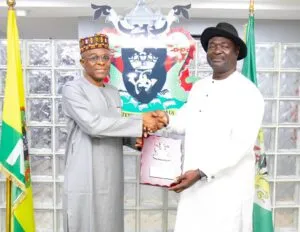There is apprehension that the minister of transport, Alhaji Ibrahim Bio may have dumped the Cabotage review committee’s report which was submitted to him about four months ago.
The committee which was headed by former chairman, Senate committee on marine transport, Senator Ugochukwu Uba had submitted the 78-page report which many stakeholders consider as very detailed and revealing to the minister in January and since then, all attempts to ensure that the recommendations are looked into has been futile.
The committee was constituted on April 2, 2008 with a mandate to review the now six – year old Coastal and Inland Shipping (Cabotage) Act of 2003 with a mandate to completely appraise the implementation of the Act.
Specifically, the committee which was led by former chairman, Senate committee on marine transport, Senator Ugochukwu Uba was mandate to “identify all vessels operating in the Coastal and Inland water trade by ownership and date of involvement in the trade, examine modalities for grant of waivers and evaluate all waivers granted so far” and also assess the need for continued retention of waiver clause in the Act.
Specifically, the committee which was led by former chairman, Senate committee on marine transport, Senator Ugochukwu Uba was mandate to “identify all vessels operating in the Coastal and Inland water trade by ownership and date of involvement in the trade, examine modalities for grant of waivers and evaluate all waivers granted so far” and also assess the need for continued retention of waiver clause in the Act.
The committee also was also tasked with the responsibility of evaluating the gains of Cabotage since its Act was enacted and also determine how much revenue has accrued to the government, in addition to evaluating the efficiency of the institutionary machinery that was put in place for the implementation of the law.
A cross section of maritime sector stakeholders who spoke on the silence of the minister on the report expressed surprise that after highly-rated committee visited some parts of the world to assess the success of Cabotage in other lands; the report has gone the way of others before it.
Sources confirmed that the committee also visited at least five ship building and repair yards in Lagos and Onne, Rivers state. The facilities include; Continental Shipyard, Nigerian Naval Dockyard, Nigerdock (all in Lagos), Starz Shipyard and West Atlantic Shipyard (both in Onne).
Sources hinted that the minister may be under pressure not to implement the review because it actually indicted some interests.
For instance, a stakeholder who craved anonymity pointed out that if the essence of the committee’s work was to engender a better Cabotage regime in Nigeria, then the minister ought to realise that time is of essence.
The report had frowned at the fact that “majority of the vessels operating in the Cabotage trade are not listed in the Cabotage special register. Vessels operating tend to be either reluctant to register or simply evade registration completely”.
It also submitted that going by the statistics submitted to it by the Nigerian Maritime Administration and Safety Agency (NIMASA), “each year, not up to 25 per cent of the vessels operating in the Cabotage trade are captured via registration”.
“There is need for the implementing agency to properly identify all vessels trading in our domestic waters through the enforcement of provisions relating to registration of vessels, particularly as regards the Cabotage Special Register by arresting non-complying vessels” , the report added.
“The implementing Agencies lack the capacity to enforce the Act. There is a dearth of human and material resources to implement Cabotage. The institutions charged with implementing the Act are therefore weak and incapable of effectively delivering on the objectives of the Act and the expectation of the promoters”, the report further pointed out.
On the all-important waiver clause, the report submitted that the essence has been defeated for as long as “vessels start operating before their waiver applications are approved. Some even complete their contracts and leave without their waiver application being approved. This makes the enforcement process unworkable and defeats the need for prior requirement for waiver before operating”.
The report consequently faulted the implementation, saying that NIMASA is more interested in collecting waiver application fess rather than in taking advantage of the clause to secure opportunities for unemployed seafarers.
On the lamentation of indigenous ship owners that Cabotage is not enhancing their businesses, the report observed that so far “there are no established rewarding incentives as well as patronage policies and guidelines for indigenous firms engaged in domestic shipping. This is unlike what obtains in other maritime jurisdictions such as the US and Malaysia where their governments have robust promotional and support initiatives. There is thus an absence of conducive environment for development of an indigenous shipping fleet”.
All efforts to get clarification form the ministry of transport were unsuccessful as the minister was unavailable. The director of maritime services, Mr Musa Karam was similarly unavailable as several telephone calls that our correspondent made were unanswered by him.
















Discussion about this post